unit2教案
- 格式:docx
- 大小:20.70 KB
- 文档页数:5
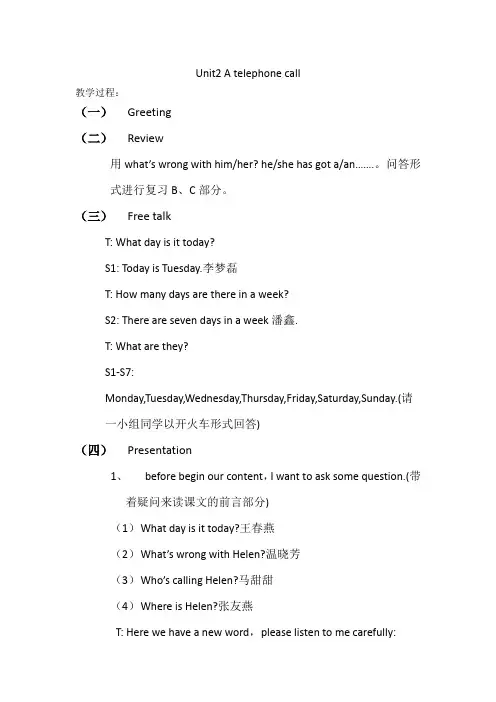
Unit2 A telephone call教学过程:(一)Greeting(二)Review用what’s wrong with him/her? he/she has got a/an…….。
问答形式进行复习B、C部分。
(三)Free talkT:What day is it today?S1:Today is Tuesday.李梦磊T: How many days are there in a week?S2:There are seven days in a week潘鑫.T:What are they?S1-S7:Monday,Tuesday,Wednesday,Thursday,Friday,Saturday,Sunda y.(请一小组同学以开火车形式回答)(四)Presentation1、before begin our content,I want to ask some question.(带着疑问来读课文的前言部分)(1)W hat day is it today?王春燕(2)W hat’s wrong with Helen?温晓芳(3)W ho’s calling Helen?马甜甜(4)W here is Helen?张友燕T: Here we have a new word,please listen to me carefully:“call”.it means 通话。
Please read after me: call (2times)T: Here is a phrase: call her after lunch. Can you try to read it?(能试着读一下吗?) S:……。
T: Yes,very good! Call her after lunch.<大家读的都很好,这个词组的意思是午饭后打电话给她。
>2、who can answer my question after read the introduction?(四个学生回答。
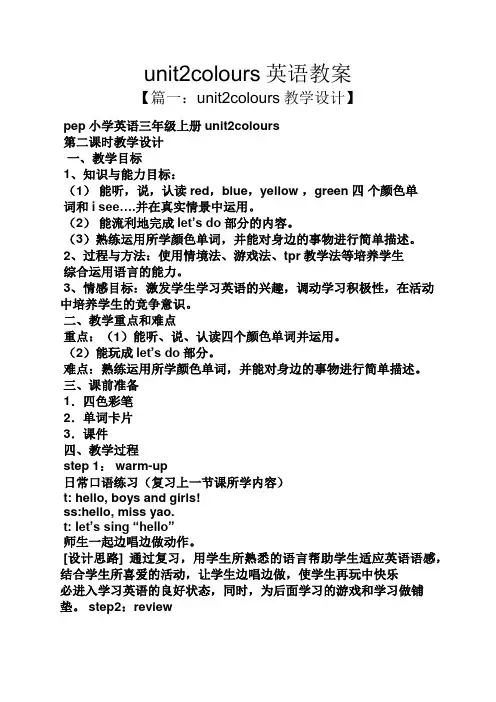
unit2colours英语教案【篇一:unit2colours教学设计】pep小学英语三年级上册unit2colours第二课时教学设计一、教学目标1、知识与能力目标:(1)能听,说,认读red,blue,yellow ,green四个颜色单词和i see….并在真实情景中运用。
(2)能流利地完成let’s do部分的内容。
(3)熟练运用所学颜色单词,并能对身边的事物进行简单描述。
2、过程与方法:使用情境法、游戏法、tpr教学法等培养学生综合运用语言的能力。
3、情感目标:激发学生学习英语的兴趣,调动学习积极性,在活动中培养学生的竞争意识。
二、教学重点和难点重点:(1)能听、说、认读四个颜色单词并运用。
(2)能玩成let’s do部分。
难点:熟练运用所学颜色单词,并能对身边的事物进行简单描述。
三、课前准备1.四色彩笔2.单词卡片3.课件四、教学过程step 1: warm-up日常口语练习(复习上一节课所学内容)t: hello, boys and girls!ss:hello, miss yao.t: let’s sing “hello”师生一起边唱边做动作。
[设计思路] 通过复习,用学生所熟悉的语言帮助学生适应英语语感,结合学生所喜爱的活动,让学生边唱边做,使学生再玩中快乐必进入学习英语的良好状态,同时,为后面学习的游戏和学习做铺垫。
step2:review出示课件:what’s in the bag?(出示文具单词的前几个字母,让学生说单词)step 3:presentation—let’s learn1、(播放课件) 让学生观看,书包的颜色用英语怎么说。
“red”暂停(教师拿出一个红色的卡片)t: what colour?ss: red.运用教室内的红色事物反复操练。
用同样方法学习其他几个新词。
2、出示let’s learn部分动画,让学生听录音,跟读let’s learn部分的词汇。
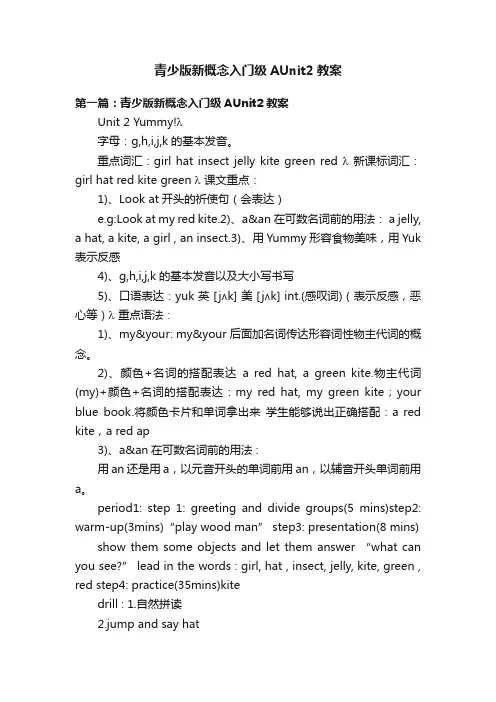
青少版新概念入门级AUnit2教案第一篇:青少版新概念入门级AUnit2教案Unit 2 Yummy!λ字母:g,h,i,j,k的基本发音。
重点词汇:girl hat insect jelly kite green red λ新课标词汇:girl hat red kite green λ课文重点:1)、Look at开头的祈使句(会表达)e.g:Look at my red kite.2)、a&an在可数名词前的用法: a jelly, a hat, a kite, a girl , an insect.3)、用Yummy形容食物美味,用Yuk 表示反感4)、g,h,i,j,k的基本发音以及大小写书写5)、口语表达:yuk 英 [jʌk] 美 [jʌk] int.(感叹词)(表示反感,恶心等)λ重点语法:1)、my&your: my&your 后面加名词传达形容词性物主代词的概念。
2)、颜色+名词的搭配表达a red hat, a green kite.物主代词(my)+颜色+名词的搭配表达:my red hat, my green kite;your blue book.将颜色卡片和单词拿出来学生能够说出正确搭配:a red kite,a red ap3)、a&an在可数名词前的用法 :用an还是用a,以元音开头的单词前用an,以辅音开头单词前用a。
period1: step 1: greeting and divide groups(5 mins)step2: warm-up(3mins)“play wood man” s tep3: presentation(8 mins) show them some objects and let them answer “what can you see?” lead in the words : girl, hat , insect, jelly, kite, green , red step4: practice(35mins)kitedrill : 1.自然拼读2.jump and say hatdrill:1.自然拼读2.touch and say jellydrill:1.自然拼读2.catch and say insect drill:1.自然拼读2.high and low voice green drill :1.自然拼读2.throw the dice reddrill:call number and say step4: review all the words by flashing cards(point and say)step5:学习课文对话 drill:听读说period 2 : step1: warm-up(2 mins)happy happy together step2: review the words(5mins)flashing cards step3: 引入颜色+名词的搭配呈现图片示范,然后让学生模仿表达step4:practice :(10 mins)red hat , green kite ………step5 :加入物主代词 my & your + 颜色+名词表达呈现图片,练习表达my green hat , your red kite …….drill: 进行中英翻译口头练习表达(10mins)step6: 引入祈使句 Look at + 物主代词+颜色+名词表达,讲解e.g Look at my red car …….10mins)practice:看图表达练习& 中英翻译口头练习step7: 通过引入 a red hat , a green kite , an insect 来学习a & an 语法和表达drill : 做判断练习()jelly()insect……练习口语表达:a red hat , a green kite………..(10mins)step8 :总结复习所有内容一周两次第一次Lesson1:period1: step 1: greeting and divide groups(5 mins)step2: warm-up(3mins)“play wood man” step3: presentation(8 mins)show them some objects and let them answer “what can you see?” lead in the words : green , red step4: practice(35mins)kitedrill : 1.自然拼读2.jump and say hatdrill:1.自然拼读2.touch and say jellydrill:1.自然拼读2.catch and say insect drill:1.自然拼读2.high and low voice green drill :1.自然拼读2.throw the dice reddrill:call number and say step4: review all the words by flashing cards(point and say)period 2 : step1: warm-up(2 mins)happy happy together step2: review the words(5mins)flashing cards drill: point and say step3: presentation引入课文对话listen to the CD and say what you have heard(7mins)Step4: practice group work to read the dialogue Pair work performance(9mins)Step5:通过引入 a red hat , a green kite , an insect 来学习a &an 语法和表达drill : 做判断练习()jelly()insect……练习口语表达:a red hat , a green kite………..(15mins)Step7: review all the contentpractice Step8: dictation 听写任务Step9:总结今天的内容让学生自己回忆girl, hat , insect, jelly, kite,第二次Lesson 2 Period1:Step:greeting and divide groups and Q&A activities(5 mins)step2: warm-up(3mins)“finger-play” game step3:review the content in the previous class(7 mins)step4: presentation of the letters g,h,i,j,kpracticepronunciation of the lettersdrill : TPR do and say the letters(8mins)step5: 引入颜色+名词的搭配呈现图片示范,然后让学生模仿表达 step4:practice :(10 mins)red hat , green kite ………step5 :加入物主代词 my & your + 颜色+名词表达呈现图片,练习表达my green hat , your red kite …….drill: 进行中英翻译口头练习表达(10mins)period2: step1:warm-up(London Bridge game) (5mins)step2: review the content(8mins)step3: 引入祈使句 Look at + 物主代词+颜色+名词表达,讲解e.g Look at my red car …….10mins)practice:看图表达练习& 中英翻译口头练习step4 : 做单元练习册20mins step5: 总结本堂课的内容让学生自己回忆第二篇:青少版新概念入门级AUnit10教案Unit 10 I’m tenλ重点词汇:one two three four five six seven eight nine ten λ新课标词汇:one two three four five six seven eight nine tenλ课文重点:1)、年龄的表达方式I’m…..e.g: I’m ten.我十岁啦2)、询问年龄的方式e.g: How old are you?3)、口语表达:Be quite!λ重点语法:I’myou’re教案:一周一次Period 1 Step1:Greeting(1m)Step2;Grouping(3m)借由分组来Call number,让小朋友先熟悉今天要学的单词(数字)Step3:warm up(3min)Let’s play XX saysStep 4: Review words(复习前面一个单元所学单词和句型)(8min)Step 5: Presentation(10min)小朋友要过生日了,但是他今天到底是多少岁的生日呢,让大家猜猜他的年龄,由此引出今天的重点单词1 2 3 4 5 6 7 8 9 10,并且复习所学过的举行Is……? Step6: Practice(5min)1 2 3 4 5 6 7 8 9 10 Drill:1.touch and say2.jump and say3.paper scissor stoneStep6: 整合单词,整体操练 Drill:Play hopsctchPeriod 2 Step 1: warm up(2min)Play a game:London Brige falling down Step 2: Review(5min)1 2 3 4 5 6 7 8 9 10 单词比较简单,多用游戏操练。
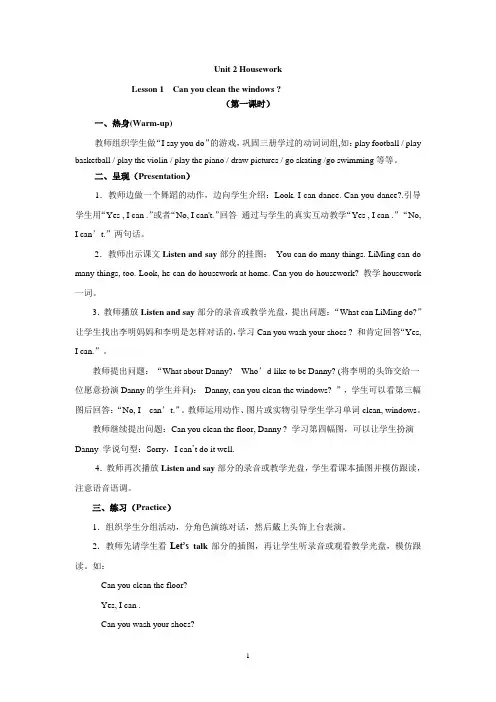
Unit 2 HouseworkLesson 1 Can you clean the windows ?(第一课时)一、热身(Warm-up)教师组织学生做“I say you do”的游戏,巩固三册学过的动词词组,如:play football / play basketball / play the violin / play the piano / draw pictures / go skating /go swimming等等。
二、呈现(Presentation)1.教师边做一个舞蹈的动作,边向学生介绍:Look. I can dance. Can you dance?.引导学生用“Yes , I can .”或者“No, I can't.”回答通过与学生的真实互动教学“Yes , I can .”“No, I can’t.”两句话。
2.教师出示课文Listen and say部分的挂图:You can do many things. LiMing can do many things, too. Look, he can do housework at home. Can you do housework? 教学housework 一词。
3.教师播放Listen and say部分的录音或教学光盘,提出问题:“What can LiMing do?”让学生找出李明妈妈和李明是怎样对话的,学习Can you wash your shoes ? 和肯定回答“Yes, I can.”。
教师提出问题:“What about Danny? Who’d like to be Danny? (将李明的头饰交给一位愿意扮演Danny的学生并问):Danny, can you clean the windows? ”,学生可以看第三幅图后回答:“No, I can’t.”。
教师运用动作、图片或实物引导学生学习单词clean, windows。
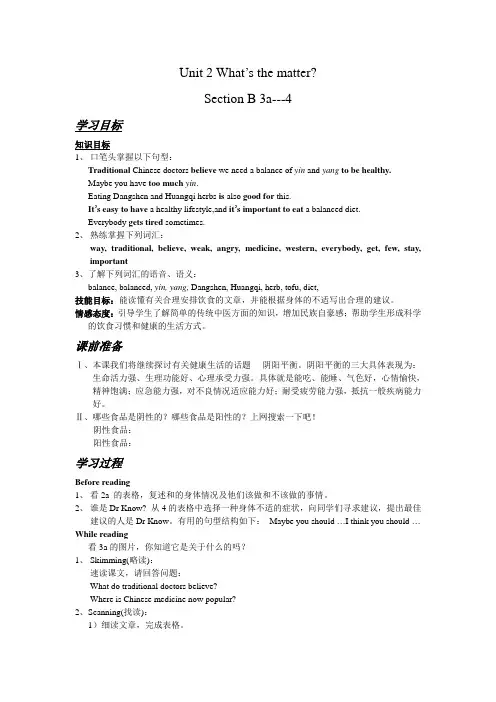
Unit 2 What’s the matter?Section B 3a---4学习目标知识目标1、口笔头掌握以下句型:Traditional Chinese doctors believe we need a balance of yin and yang to be healthy.Maybe you have too much yin.Eating Dangshen and Huangqi herbs is also good for this.It’s easy to have a healthy lifestyle,and it’s important to eat a balanced diet.Everybody gets tired sometimes.2、熟练掌握下列词汇:way, traditional, believe, weak, angry, medicine, western, everybody, get, few, stay, important3、了解下列词汇的语音、语义:balance, balanced, yin, yang, Dangshen, Huangqi, herb, tofu, diet,技能目标:能读懂有关合理安排饮食的文章,并能根据身体的不适写出合理的建议。
情感态度:引导学生了解简单的传统中医方面的知识,增加民族自豪感;帮助学生形成科学的饮食习惯和健康的生活方式。
课前准备Ⅰ、本课我们将继续探讨有关健康生活的话题----阴阳平衡。
阴阳平衡的三大具体表现为:生命活力强、生理功能好、心理承受力强。
具体就是能吃、能睡、气色好,心情愉快,精神饱满;应急能力强,对不良情况适应能力好;耐受疲劳能力强,抵抗一般疾病能力好。
Ⅱ、哪些食品是阴性的?哪些食品是阳性的?上网搜索一下吧!阴性食品:___________________________阳性食品:___________________________学习过程Before reading1、看2a 的表格,复述和的身体情况及他们该做和不该做的事情。
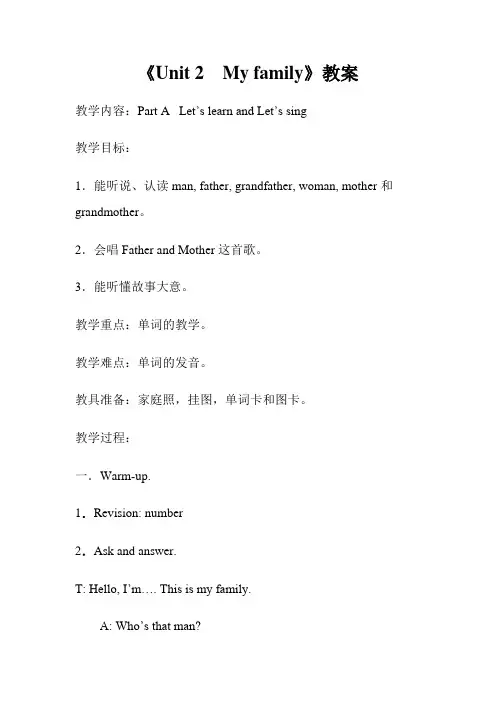
《Unit 2 My family》教案教学内容:Part A Let’s learn and Let’s sing教学目标:1.能听说、认读man, father, grandfather, woman, mother和grandmother。
2.会唱Father and Mother这首歌。
3.能听懂故事大意。
教学重点:单词的教学。
教学难点:单词的发音。
教具准备:家庭照,挂图,单词卡和图卡。
教学过程:一.Warm-up.1.Revision: number2.Ask and answer.T: Hello, I’m…. This is my family.A: Who’s that man?T: He’s my dad.A: I’m…. This is my family.T: Who’s that woman?A: She’s my mom.二.Presentation1.Show the picture of family tree: This is my family. Her are 7 people in my family: my grandpa, my grandma, my dad, my mom, my sister, my brother and me.2.Teaching the word: grandfather. Repeat the word again. 3.Do the same thing: Teaching the other words.Point: grandma and grandpa are speaking language. 三.Practice1.Play game.1) Who quickly2) Find out the photo2.Listen and read3.Trishaw me the picture of your mom.(…) This is my mom.四.Let’s sing.Sing the song “Father and Mother”《Unit 2 My family》说课材料一、说教材1.教学内容与分析我说课的内容是人教版三年级下册Unit2“My family”B 部分第二课时。
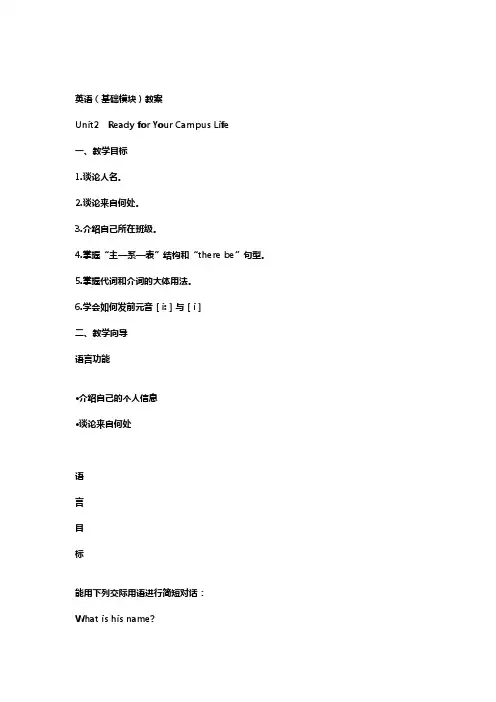
英语(基础模块)教案Unit2 Ready for Your Campus Life一、教学目标1.谈论人名。
2.谈论来自何处。
3.介绍自己所在班级。
4.掌握“主—系—表”结构和“there be”句型。
5.掌握代词和介词的大体用法。
6.学会如何发前元音[i:]与[i]二、教学向导语言功能·介绍自己的个人信息·谈论来自何处语言目标能用下列交际用语进行简短对话:What is his name?His name is….Where is he from?He is from….语言结构“主—系—表”结构和“There be”句型重点辞汇ready, campus, beautiful, search, important, practice, adapt, concern, repair, Russia, America, Britain, handsome三、课文讲解(一)Warm-up1.老师首先用英语向全班学生作自我介绍,并提出新学习阶段的英语学习要求。
例如:Hello, everyone. My name is….I’m your English teacher this year. Let’s do our best together to improve our Learning of English. Now at the beginning of this term, I would like to advise you to plan your time carefully. Be sure to have enough time to recite the new words and useful expression, to listen to enough English tapes, to read many English articles, to do oral practice as much as possible and to finish your homework on time.Second, I advise you to make good use of your time in class. Listening carefullyin class really means less work later. Taking notes will help to remind you what the teacher said.Another important suggestion is that you should develop a good attitude towards your English reading, listening, speaking and writing. Don’t be afraid of making mistakes when you are speaking English. Just try your best to say what you want in English every time.I’ll do my best to help you and I hope everyone will get a great progress in the shortest possible time….另外,还可以设计一些常常利用口令、手势、规定一些纪律,以便在以后的教学中,形成良好的习惯,达到默契。
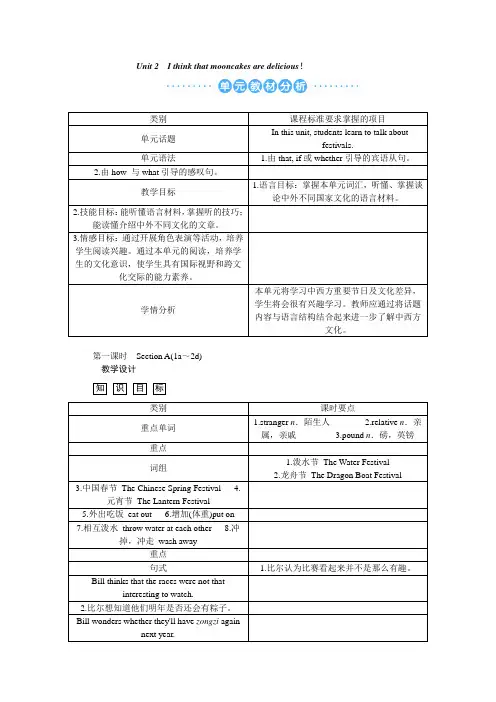
Unit 2I think that mooncakes are delicious!类别课程标准要求掌握的项目单元话题In this unit, students learn to talk aboutfestivals.单元语法 1.由that, if或whether引导的宾语从句。
2.由how 与what引导的感叹句。
教学目标1.语言目标:掌握本单元词汇,听懂、掌握谈论中外不同国家文化的语言材料。
2.技能目标:能听懂语言材料,掌握听的技巧;能读懂介绍中外不同文化的文章。
3.情感目标:通过开展角色表演等活动,培养学生阅读兴趣。
通过本单元的阅读,培养学生的文化意识,使学生具有国际视野和跨文化交际的能力素养。
学情分析本单元将学习中西方重要节日及文化差异,学生将会很有兴趣学习。
教师应通过将话题内容与语言结构结合起来进一步了解中西方文化。
第一课时Section A(1a~2d)教学设计知识目标类别课时要点重点单词1.stranger n.陌生人 2.relative n.亲属,亲戚 3.pound n.磅,英镑重点词组1.泼水节The Water Festival2.龙舟节The Dragon Boat Festival3.中国春节The Chinese Spring Festival4.元宵节The Lantern Festival5.外出吃饭eat out6.增加(体重)put on7.相互泼水throw water at each other 8.冲掉,冲走wash away重点句式 1.比尔认为比赛看起来并不是那么有趣。
Bill thinks that the races were not thatinteresting to watch.2.比尔想知道他们明年是否还会有粽子。
Bill wonders whether they'll have zongzi againnext year.课堂环节§自主学习案翻译下列词组。
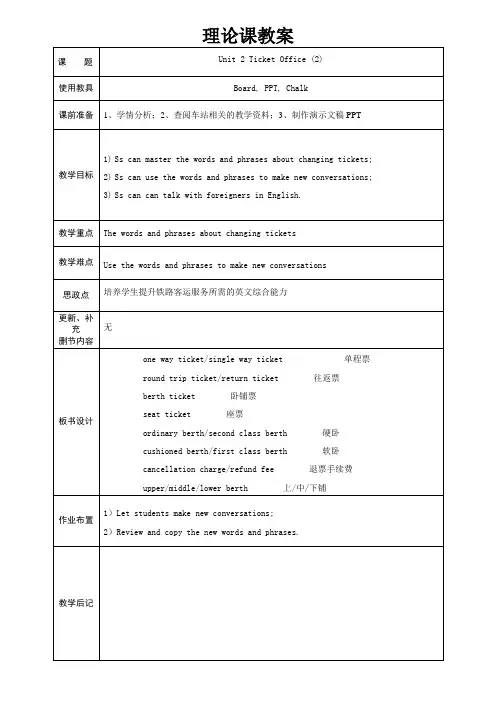
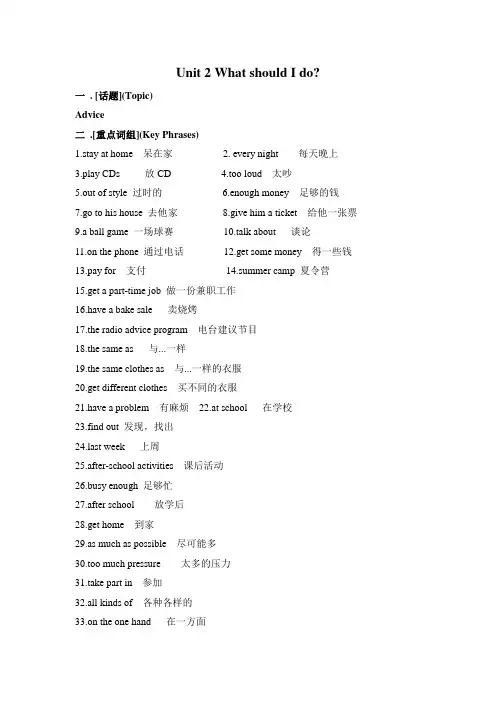
Unit 2 What should I do?一. [话题](Topic)Advice二.[重点词组](Key Phrases)1.stay at home 呆在家2. every night 每天晚上3.play CDs 放CD4.too loud 太吵5.out of style 过时的6.enough money 足够的钱7.go to his house 去他家8.give him a ticket 给他一张票9.a ball game 一场球赛10.talk about 谈论11.on the phone 通过电话12.get some money 得一些钱13.pay for 支付14.summer camp 夏令营15.get a part-time job 做一份兼职工作16.have a bake sale 卖烧烤17.the radio advice program 电台建议节目18.the same as 与...一样19.the same clothes as 与...一样的衣服20.get different clothes 买不同的衣服21.have a problem 有麻烦22.at school 在学校23.find out 发现,找出st week 上周25.after-school activities 课后活动26.busy enough 足够忙27.after school 放学后28.get home 到家29.as much as possible 尽可能多30.too much pressure 太多的压力31.take part in 参加32.all kinds of 各种各样的33.on the one hand 在一方面34.on the other hand 在另外一方面35.by oneself 亲自三.[交际用语]1. What should I do?我应该怎么做?2. You could write him a letter.你可以写信给他。
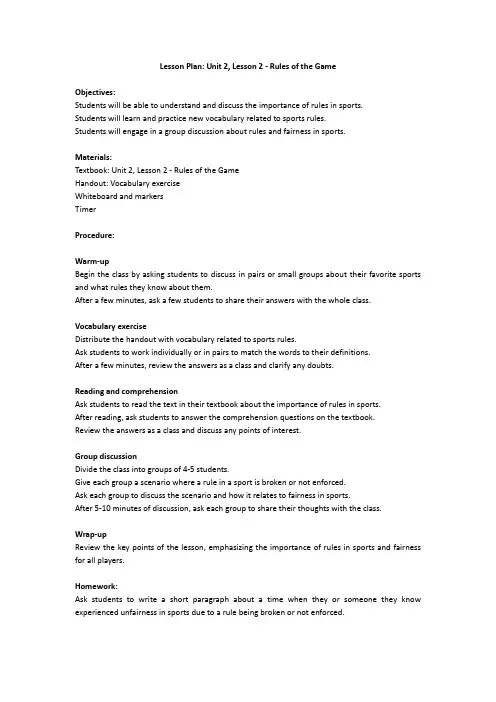
Lesson Plan: Unit 2, Lesson 2 - Rules of the GameObjectives:Students will be able to understand and discuss the importance of rules in sports.Students will learn and practice new vocabulary related to sports rules.Students will engage in a group discussion about rules and fairness in sports.Materials:Textbook: Unit 2, Lesson 2 - Rules of the GameHandout: Vocabulary exerciseWhiteboard and markersTimerProcedure:Warm-upBegin the class by asking students to discuss in pairs or small groups about their favorite sports and what rules they know about them.After a few minutes, ask a few students to share their answers with the whole class.Vocabulary exerciseDistribute the handout with vocabulary related to sports rules.Ask students to work individually or in pairs to match the words to their definitions.After a few minutes, review the answers as a class and clarify any doubts.Reading and comprehensionAsk students to read the text in their textbook about the importance of rules in sports.After reading, ask students to answer the comprehension questions on the textbook.Review the answers as a class and discuss any points of interest.Group discussionDivide the class into groups of 4-5 students.Give each group a scenario where a rule in a sport is broken or not enforced.Ask each group to discuss the scenario and how it relates to fairness in sports.After 5-10 minutes of discussion, ask each group to share their thoughts with the class.Wrap-upReview the key points of the lesson, emphasizing the importance of rules in sports and fairness for all players.Homework:Ask students to write a short paragraph about a time when they or someone they know experienced unfairness in sports due to a rule being broken or not enforced.Homework:Write a short paragraph about a time when you or someone you know experienced unfairness in sports due to a rule being broken or not enforced. Describe the situation and how it made you feel. Reflect on what could have been done to prevent the unfairness.。
六下unit 2 Good habits六下Unit2单元回顾与练习主备:张建民审核人:徐丽终审人:王雅玲学校_______________ 班级______________ 姓名______________【教学目标】1.知识目标:①能掌握并熟练运用副词fast/slowly, well/badly, early/late。
②能掌握并熟练运用频率副词always, usually, often, sometimes, never。
③能掌握并正确运用一般现在时,掌握判断时态的常见方法。
④能掌握对划线部分提问的方法。
2.能力目标:能正确运用本课中所复习的语法内容。
3.情感目标:学会思考和总结,养成认真审题、细致分析的答题习惯。
【课前准备】1.复习本单元书上所有板块的内容、识记重点词句,回忆一般现在时动词三单变化规则以及副词变化规则。
2.复习本单元作业纸中自己的错题。
3.完成下列英汉互译。
很多好习惯_____________ 从不晚睡_______________________早起__________________ 把……整理得井井有条______________ 表现好________________ 一些坏习惯______________________ 带……参观_______________ 进入起居室____________________她早上起床早,从来不晚睡。
______________________________________________________________ 他总是保持他的房间既干净又整齐。
_______________________________________________________________【课堂活动】一、重难点突破:1. 一般现在时态:(1) 概念:表示经常性或习惯性的动作,表示人或物现在的特征或状态,表示客观存在的事实或真理等。
人教高中英语必修一unit2教案Module 1 Unit 2 English around the world●单元规划本单元主要围绕English around the world这一主题介绍了英语的使用情况、发展情况及各地不同的方言。
第二单元English around the world的设计可分为五部分。
第一部分learn something about words and expressions;第二部分warming up and reading;第三部分the structure which expresses commands and requests;第四部分using language;第五部分writing and speaking;●课时安排本单元教学可分为6个课时。
第一课时vocabulary;第二课时为reading;第三课时为language points;第四课时为grammar;第五课时为using language;第六课时为writing and speaking;第七课时为revisionThe First Period Words and expressionsTeaching aims :1. Know the key words and expressions in the whole unit:elevator, petrol, official, voyage, actually, base, identity, command, request, recognize, straight, because of, come up, at present, such as, play a part (in)……2. Enable the students to get familiar with the pronunciation of the important words.3. Prepare for the learning process of the whole unit.Teaching important points :1.Get familiar with the words in the text part.2.Master the important expressions such as:bec ause of, come up, at present, such as, play a part (in)……Teaching methods: Task-based teaching and learning; cooperative-learning; group discussionTeaching procedures :Step 1、Self-directed learning学习方法指导:第一步:写出所给单词的音标;第二步:大声朗读三遍,注意画线字母的发音;第三步:依次写出画线字母的音标。
Unit 2 Last weekendPart A 第一课时Let’s try & Let’s talk【教学目标】1.学习drank,show等单词。
2.全体学生能运用句型“What did you do?I stayed at home with your grandma.We drank tea in the afternoon and watched TV.”。
3.理解掌握运用动词过去式的句子。
4.能朗读课文,并能进行角色表演。
5.在小组的讨论交流中,培养学生综合运用英语的能力。
【教学重点】运用句型“How was your weekend?It was good.Did you do anything else?”提问,并能结合实际回答有关周末活动的安排。
【教学难点】一般过去时动词词尾的规则变化。
(此难点为预设难点,教师可根据班级实际情况调整)【教学准备】1.单词卡片2.录音机及录音带或教学光盘3.多媒体课件【教学过程】Step 1:Warm-up1.日常口语问候。
T:Hello, boys and girls.S:Hello, Ms.Wang.T:Nice to see you again.S:Nice to see you, too.2.头脑风暴。
教师说中文,学生快速说出英文,复习词组:see a film,takea trip,draw pictures,go swimming,go fishing,do homework,watch TV,readbooks,wash my clothes,play football,play basketball,play ping pong 等。
3.谈话导入。
T: What do you do on the weekend?S:I often clean my room / …T: What did you do yesterday?S:I watched TV / …Step 2:Presentation1.T:How are you today?S:I’m fine,thanks.T:How was your weekend?S:It was good, thank you.(is的过去式是was,师生互问互答)2.T:What do you often do on the weekend?S:I often watch TV.T:What did you do last weekend?S:I stayed at home with my brother.(教读)3.教师在课件上呈现两组句子,引导学生认真观察,并尝试找出规律。
Unit2 Good habits一、教材分析本单元的话题是生活习惯和学习习惯。
这一话题与学生的生活实际密切相关,教师在教学中要引导学生多联系自己的实际情况,分析和判断什么是好习惯、什么是坏习惯,帮助他们在今后的学习和生活中形成好习惯、摈弃坏习惯,更有效地学习、更健康地生活。
本单元在语法方面延续了第一单元的副词话题。
二、教学目标1.能听懂、会说、会读课文Good habits2.能听懂、会说、会读常用语及句型He/She gets up / goes to school in the morning. He/She never goes to bed late.3.能听懂、会说、会读、会写词汇put…in order, bad ,sleepy, last night, go into, slowly, badly4.能听懂、会说、会读词汇child, habit, never, late, finish, tidy, fast5.能听懂、会唱歌曲This is the way6.能听懂会说且准确发音字母or在单词中的读音。
三、教学重点1.能听懂、会说、会读常用语及句型He/She gets up /goes to school in the morning. He/She never goes to bed late.2.能听懂、会说、会读、会写词汇put…in order, bad ,sleepy,last night, go into, slowly, badly四、教学难点副词的理解及运用。
五、教学准备1. 教具:多媒体等2. 板书:写好课题Unit2 Good habits第1课时 (总第课时)上课时间:月日课型:课一、教学内容Unit 2 Good habits (Story time)二、教学目标1. 能正确理解、朗读课文并可以根据提示复述课文内容。
2. 能听懂、会读、会说单词: tidy, messy, habits, in order, finish always sleepy bedtime.3. 能尝试根据所学短语和句型来描述自己的习惯。
Unit 2The Olympic Games 1.compete vi.竞争;对抗;参加比赛/竞赛compete with/against sb for sth为获得某物而与某人竞争 compete with sb on sth 在某事上与某人竞争 competiton n.竞争,角逐competitor n.竞争者,对手 competitive adj.竞争的,有竞争力的 (1)Several companies are competing for the contract. (2)We can’t compete with them on price. (3)She is hoping to compete in the London Marathon. (4)Graduates have to fight for jobs in a highly competitive market. (5)There is now intense competition in schools to attract students. 2.take part (in sth) 参加(某项活动) take one’s part 支持某人,站在某人一边 have/play a part in参与某事,扮演角色,起作用 have a part to play in sth在某事中发挥作用 for the most part 多半,通常 (1)The contributors(投稿者,贡献者,捐助者) are, for the most part,professional scientists. (2)She plays an active part in local politics. (3)His mother always takes his part. (4)In the south of France,for the most part,it is warm and sunny. (5)Electricity plays an important part in our everyday life. (6)Everybody has a part to play in building a more friendly living environment. (7)Her husband takes an active part in the activities of helping the disabled children. 3.stand for代表,是…的意思 stand by 袖手旁观,支持某人,遵守诺言 stand in for sb代替,顶替某人 stand out 杰出,突出,显眼,更为重要 stand up 起立,站立,维护 stand over 监视 监督 stand aside 站到一边,不参与某事,让开 stand back 往后站,退后 (1)The man stood aside to let us pass. (2)The police ordered the crowd to stand back and stop shouting. (3)I hated the organization and all it stood for. 4.basis n. 基础,根据,模式,缘由on the basis of /that …因为,由于… on regular basis 定期地,固定地 on a daily/weekly basis 按每天/每周的标准 basic adj.基本的;必需的;基础的 basically adv.大体上,基本上,总的来说 base n.基础,底部,根据地 v. 以…为基础 base A on/upon B 以B作为A的基础或根据 basis 的复数bases basis 指抽象的基础根据模式方式 base 表示具体含义,还有“总部,根据地”的意思 (1)What’s the basis of your opinion? (2)She was chosen for the job on the basis of her qualification and ideas. (3)The Olympic Games are held every four years on a regular basis. (4)Drums are basic to African music. (5)The two methods are basically very similar. (6)The employees are paid on a weekly basis. (7)This article will form the basis of our discussion. 5.admit vt. vi.承认,允许进入 admit of 容许做了,有…可能 admit…into/to …允许进入某处 admit doing sth承认,招供做了某事 admission n. 门票,入场费,承认,加入权 admittance n. 进入,进入权 (1)You will not be admitted into the theater after the performance has started. (2)This plan admits of no delay. (3)They tried to get into the club,but were refused admission. (4)Hundreds of people were unable to gain admittance to the hall. (5)If you leave the club, you will not be admitted back in. 6.in charge (of sb/sth)负责,掌管,主管(某人/某物)sb/sth be in the charge of sb=sb/sth be in one’s charge 某人/某物由某人负责 take charge of sb/sth 负责,掌管,主管某人/某物 free of charge 免费地charge v.控告,指控,收费 charge sb with sth/doing sth 因为某事而控告某人 charge (sb)sth for sth因为某物而收取某人费用 (1)She left her mother in charge of her child for a week. (2)The whole apartment is in a mess.Who is in charge these days? (3)Now the company is in charge of the son of the manager. (4)The man took charge of the farm after his father’s death. (5)What did they charge for the repairs? (6)The young man was charged with murder. (7)I am leaving the school in the charge of you. (8)You don’t have to pay anything;the present was given to you free of charge. 7.fine vt.罚款 fine sb (a sum of money)for (doing) sth因做某事处某人…罚金 (1)The company was fined$20,000 for breaking safety regulations. (2)The man was fined for speeding. (3)How much were you fined for breaking the operating rule? 8.bargain n. 便宜货,减价品 v. 商讨价格,讨价还价 bargain with sb about /over for sth 和某人就某事物讨价还价 bargain for/on sth 预料到/料想到某事 bargain sth away贱卖某物,做亏本交易 (1)I picked up a few bargains in the sale. (2)He said he wasn’t willing to bargain with the shop assistant. (3)I didn’t bargain on finding them here. (4)We hadn’t bargain for/on this sudden change in the weather. (5)In the market,dealers were bargaining with growers over the price of coffee. 9.pick up 捡起;偶然学会;便宜买到;搭载车辆;开车接某人;接收;好转 pick at 小口吃 pick off 去掉,剪掉,逐个毁掉 pick on 故意刁难,挑中 pick out 挑选,辨别出 (1)My radio can pick up the program of BBC. (2)Sales have picked up 14% this year. (3)The bus stopped to pick up passengers. (4)Where did you pick up the second-hand bicycle? (5)The bird is picking at the grains left in the field. (6)He picked off all the dead leaves. (7)I can easily pick you out in the crowd. (8)This picture was taken a long time ago.I wonder if you can pick out my father. (9)I picked up Spanish when I stayed in Spain. (10)He picked out the ripest peach for me. (11)To our excitement,trade is picking up these days. 10.deserve vt. vi.应受,值得,应得 deserve to do 值得做某事 应该做某事 deserve doing 值得被… deserving adj.值得的,应得的 deservedly adv. 应得地,理所当然地